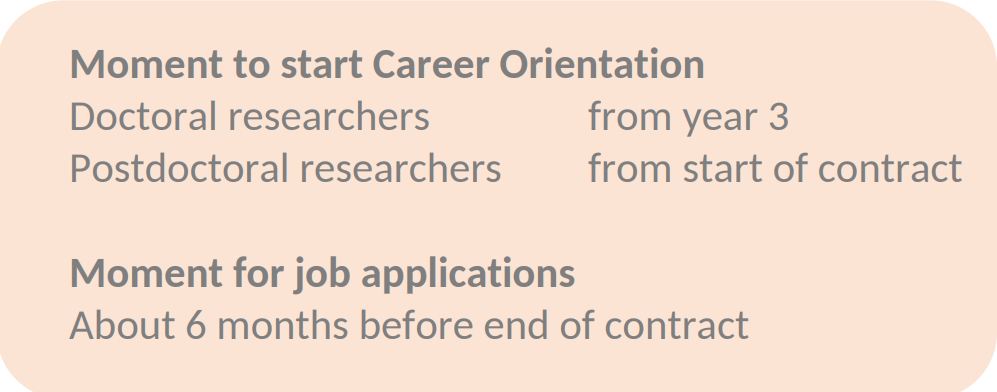PI Support
Supporting your researchers in advancing their career is not a task that is solely in your hands. Nonetheless as a PI, you are likely to be a person nearby. With simple actions you can play a key role in the career development of your research staff. Bellow are some suggestions of what you could do.
PhD/Postdoc as Transitory Career Stages
Early career researchers (ECRs including doctoral and postdoctoral researchers) have in common that their employment is temporary. In Germany, this is even prescribed by law in the so-called Wissenschaftszeitsvertraggesetz (Academic Fixed-Term Contract Act).
How can you support?- Discuss career development. As any ECR is in transition, ensure they know you know and also that you are available for support. Keeping an open conversation on future career not only shows good employment practices, the Guidelines for the Postdoc Phase within the Helmholtz Association even defines this as a compulsory element: an in-depth Career Development Meeting is to be carried out between supervisor and postdoc the latest in the 4th year after PhD graduation.
- Encourage to initiate career orientation as early as possible, as it is a process that requires time. While it will not consume too much time at early stage, it will allow your researcher to better identify opportunities for development.
- Ask informally about the progress of career development, it is easier for your ECR to share what obstacles they may have encountered, allowing you to think along, give feedback or refer to potential help.
- Keep in mind by what date the postdoc should have moved on his/her career to a position beyond the Academic Fixed-Term contracts.
Duties of Doctoral and Postdoctoral Researchers

The temporariness of being an ECR requires good preparation for the next career step. It is supportive as a supervisor to acknowledge this task next to conducting research, teaching, supervision of students and/or lab management duties.
Important decisions are to be taken about WHAT that next step should be, long before your researcher starts applying. Decision taking is often challenging; it is not always clear what to do and where to start.
How can you support?- Proactively ask about their ideas about their next career step in regular meetings and definitely during the yearly appraisal.
- Ensure your PhD/postdoc is aware what is expected from them beyond scientific research. You may want to refer them to the Responsibilities of the Postdoc section in the Helmholtz Guideline.
- Allow your researchers to plan and carry out career development activities. With careful planning, these activities do not necessarily have to compete with research. On the contrary, your researcher may be more motivated with a career plan and with less concerns about the future.
-
Be aware that engaging in career activities does not mean that your ECR is getting ready to leave your group.
Career development consists of two parts to be carried out at different moments:
- Career Orientation: reflection, informing yourself and identify suitable jobs.
- Transition: preparing for the next career step, job application.
A PhD as a Stepping Stone Within and Beyond Academia
While ECRs strongly focus on scientific output, the academic career path is not necessarily their future. Fortunately, the PhD/postdoc experience equips an ECR with a broad set of transferable skills and is a proof of many personal qualities (e.g. self-motivation, discipline, dedication, hard-working, the ability to master new skills quickly): Stepping stones that qualify PhD graduates for a broad spectrum of careers, within academia and beyond. It is vital that your researchers are aware of their professional value and know how to convey this.
How can you support?- Discuss strengths and weaknesses in an open way. Besides focusing on what someone should improve, do also provide feedback on the talents of your researchers: What tasks go well naturally and is your researcher attracted to? Awareness of these strengths may lead to specific future options.
- Give feedback. A good place to initiate skill assessment is the Skill Check. Support by providing feedback using the Skills Assessment Form.
- Be non-judgmental and acknowledge the PhD/postdoc experience as stepping stone for a broad spectrum of careers. The academic experience yields many acquired transferable skills and proven personal qualities that is valued both within and beyond academia.
- Encourage your researcher to meet with a Career Advisor when unaware of the added value of being a PhD graduate on the job market. Awareness of what they have to offer and being able to convince other are vital steps to take the lead in career development.
Options, options, options…?
ECRs are surrounded by senior academics. Their perception of what it is like to be principal investigator/group leader is likely based on how you manage your research group. After all, you are likely the senior academic they are most exposed to! What other career paths exist, especially those beyond academia or your research topic, are more difficult to oversee.
Career orientation is as well important for careers within academic research: After determining what kind of PI you would like to become in what conditions (focus, location, …), allows you to identify the best fitting institutes.
How can you support?- Refer to the job profiles on CareerCheck. Although is not (and will never be) a complete overview, it provides insights in the broad spectrum of career options.
- Share your network! It is very helpful to refer to your former (post)doctoral researchers or other relevant contacts within your network (e.g. through DKFZ Connect, LinkedIn). This allows your researchers to learn specific things about a job. If your institute has an alumni network, encourage your departing PhDs/postdocs to join to keep in touch.
- Be non-judgmental and acknowledge the PhD/postdoc experience as stepping stone for a broad spectrum of careers. The academic experience yields many acquired transferable skills and proven personal qualities that is valued both within and beyond academia.
- Encourage to attend Career Events to get exposed to a diversity of PhD career stories. Career stories are always inspirational to define one's individual preferences and values, and may even allow identification of matching positions!
Decision-Taking

It is difficult to decide on a future career when it is not clear what to expect and whether one would actually like a job. It is difficult to prepare for the next career step when one is still uncertain about the goal. This circular reasoning may cause many a researcher to lose focus on career development and postpone this process until the moment their contract runs out.
How can you support?- Be alert at indecisiveness by this circular reasoning. This happens more often than not. Some researchers find themselves stuck in this process for such a long time that they get completely discouraged to engage in career development.
- Verify expectations with your researcher. The academic future may look more challenging when in doubt. Discuss preferences, values and support. As a group leader you are likely to have better overview of what can be expected.
- Encourage your researcher to see a career advisor. Career orientation should be an effective and targeted process, in which progress is being made. Career advisors will support your researcher to structure this process and to set up an effective career orientation strategy.
Entering the Transition Stage
The moment your (post)doctoral researcher has identify the preferred future career, the transition stage start. The focus moves to the identification of requirements, strengthening the profile for the next career step, and finding and landing the job!
How can you support?- Keep your eyes open for opportunities to strengthen skills "on the job", e.g. involving your researcher in a rebuttal, grant application or the organization of an event.
- Encourage advanced trainingyou may want to refer to this Events & Training calendar.
- Support to find a good balance between research tasks and personal/career development.
Summary
- Support the career development of your researchers
- ake a proactive role to discuss future career
- Provide feedback
-
Refer to available support:
- CareerCheck (this website)
- Career Advisors/Career Center
- Relevant contacts
A Final Word
Be a Mentor: this means not only talking TO but you may want to engage in more in-depth discussions and give recommendations. Consider sharing your knowledge and experience to support others to grow. At certain institutes this is formalized in Mentoring Programs e.g. DKFZ Tailored Mentoring.
Career Development never ends. As a group leader you may as well feel inspired to continue developing your own career. Maybe you would like to be more involved in e.g. program development, education or public engagement? Do check our resources for Academic Research and Teaching and please welcome to discuss your own career confidentially at the Career Center.


 PREFERENCE CHECK
PREFERENCE CHECK